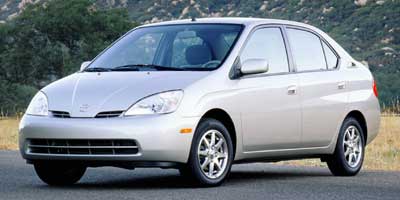Believe it or not, the humble Toyota Prius has been on sale in the U.S. for 12 years.
While many of these original 2000 Priuses are still giving their owners the same gas milage they did when new, traction battery packs inside early cars are reaching the end of their predicted 10 year, 300,000 mile life.
If the battery pack in your Toyota Prius dies before the end of its 150,000 (or 100,000) mile warranty, Toyota will replace it free of charge. But if your car is out of warranty, you join the 500 or so owners every month experiencing an expired nickel-metal-hydride battery pack.
For them, reduced performance and a dashboard warning light indicate it’s time to visit the dealer and make a choice: buy a new battery pack, or a new car.
Gary Smith, Toyota’s corporate manage of product quality and service support, is keen to point out that the numbers of failing Prius battery packs are still extremely low.
It's also worth pointing out that while battery packs are warrantied for 150,000 (or 100,000) miles depending on the state you live in, many battery packs can survive twice that mileage or more.
However, given the 1.3 million Toyota hybrids now on the roads in the U.S., the number of failing battery pack incidents will rise over the coming years.

2002 Toyota Prius
For out-of-warranty cars, you’ve got two choices: replace the battery, or the car.
As we’ve told you before, the unit cost of a Toyota Prius battery pack is between $2,300 and $2,590, depending on the model you have. Installation of a new pack is likely to cost you more. However, for reference, the cost of replacing a battery pack is a little less than the average engine rebuild on a similar-age high-mileage car.
And while there are cheaper alternative routes to a dealer-supplied battery pack, most Prius owners will want to return to the dealer they purchased the car from to ensure that neither they -- or a local mechanic unfamiliar with hybrids -- damages their car trying to fit a replacement pack.
For dealers, a Prius owner with a dying hybrid battery pack is a welcome customer.
“We tell them, ‘Here’s what’s going to happen in the next year or two’,” explains Mike Sullivan of Multiline Toyota in Santa Monica, California. “People don’t get mad. They understand it’s a seven- or eight-year life cycle.”
Rather than continue to drive a car with a dying battery pack, many owners -- some of which are ready for a new car anyway -- choose to trade their cars in for a new model Prius.

2012 Toyota Prius
The old car is then fitted with a new battery pack, and sold on by the dealer.
“The Prius is a good entry-premium car, and when this happens, we can get people to trade up to the next hybrid,” Sullivan said. “It’s a good story for us.”
Regardless of what the owner chooses, expired battery packs aren’t wasted, thanks to a battery recycling program Toyota launched in 2010.
After being removed, the battery pack is sent to specialist recycling firm Kinsbursky Brothers in Anaheim, California -- the same firm responsible for recycling used lithium-ion battery packs from Tesla.
On arrival at the specialized facility, battery packs are broken down into their constituent parts, with nickel being smelted down for stainless steel used in making refrigerator doors, while rare-earth elements, plastic casings and electrolyte are all recycled into appropriate industries.
Ultimately, the whole process is a win-win scenario for everyone involved: dealers get extra customers, and customers get to choose between a newer model with even better gas mileage or a new battery pack. More importantly perhaps, not a single traction battery pack ends up in landfill, proving that batteries -- no matter what their chemistry -- are still the most recycled consumer product.
+++++++++++













